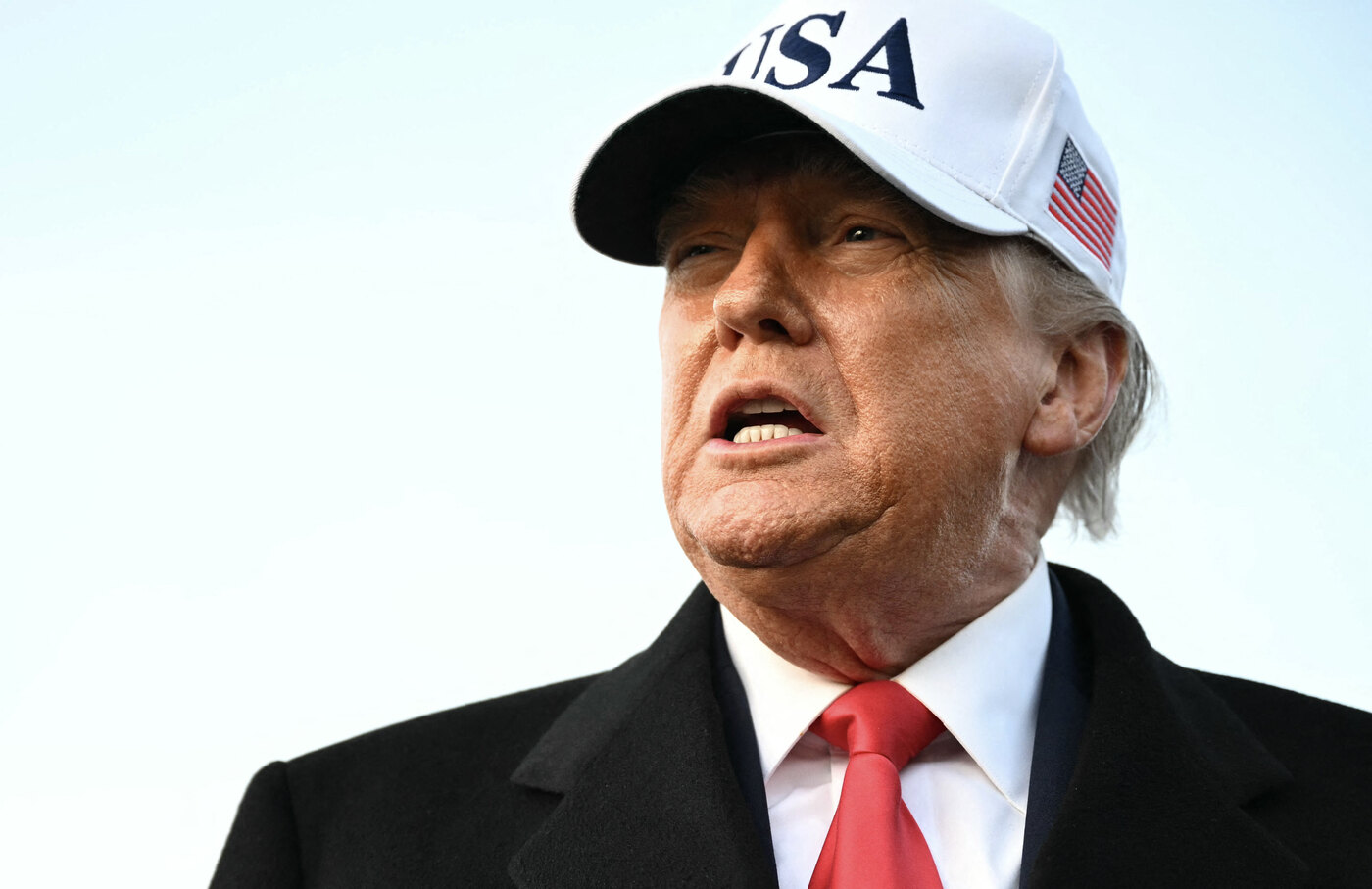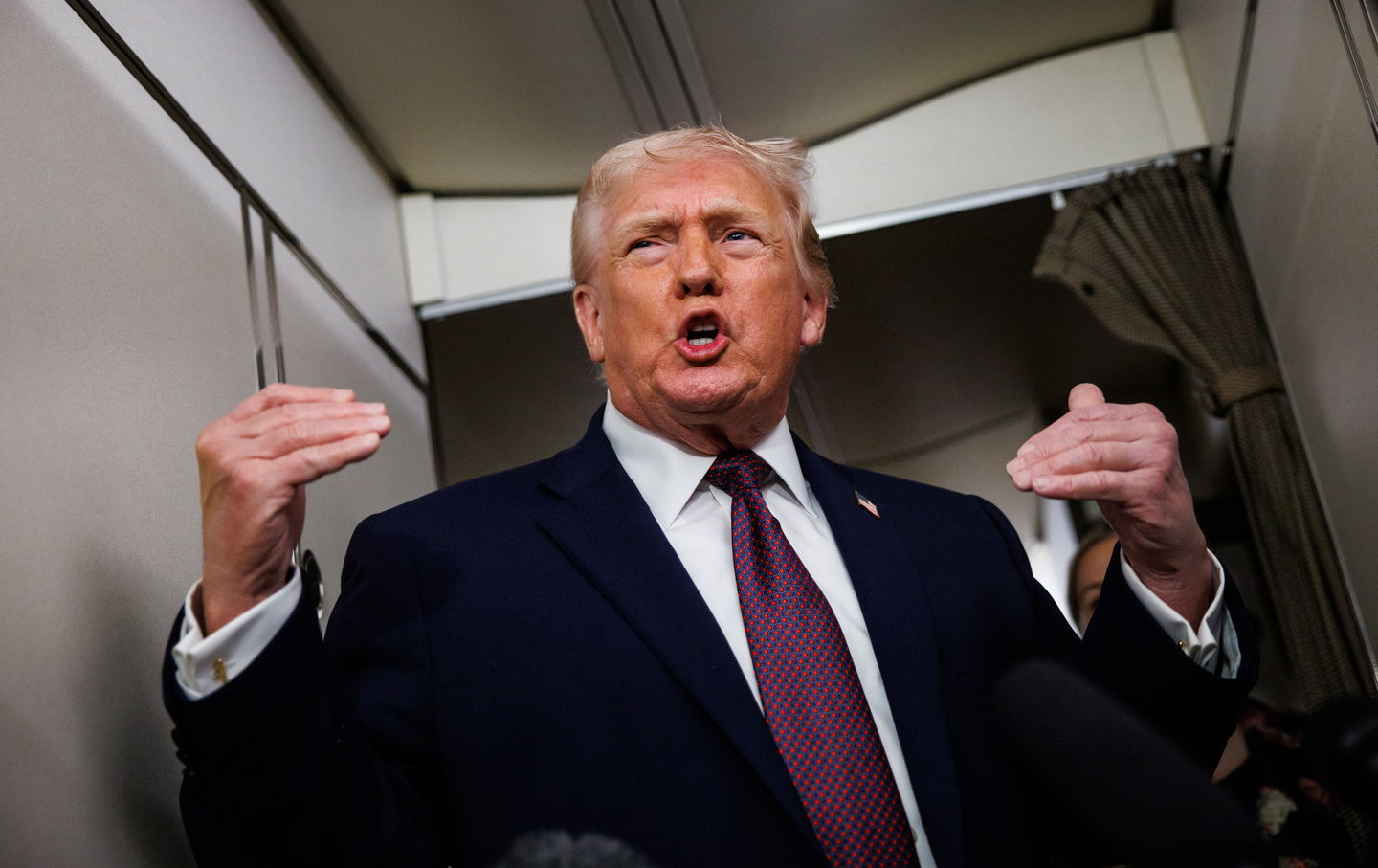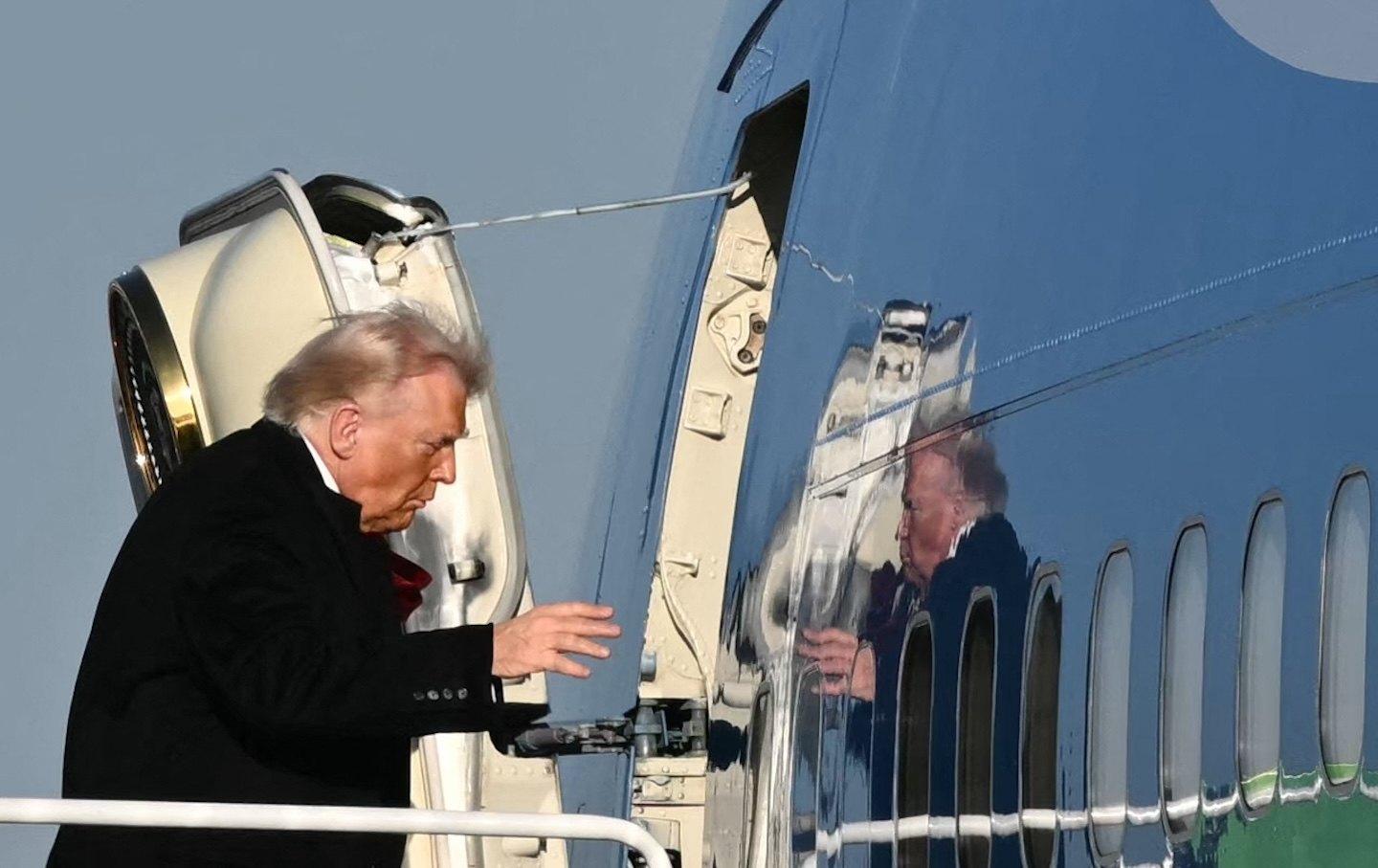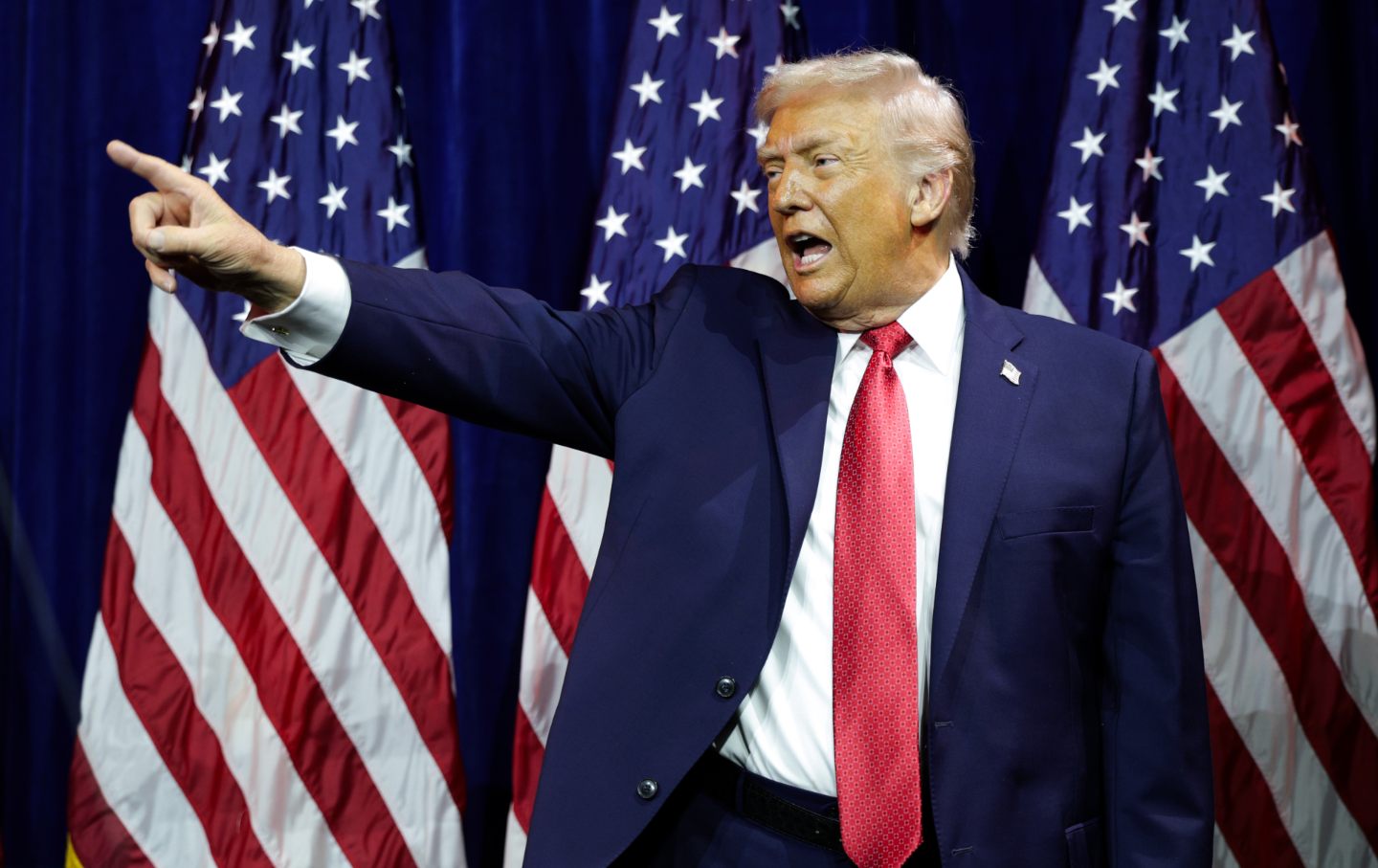The DNC v. Trump, Nonprofits v. Trump
On this episode of Start Making Sense, John Nichols on the candidates for DNC chair, and Katha Pollitt on groups that may help Trump’s victims.

President Donald Trump talks with ABC News anchor George Stephanopoulos before a town hall at National Constitution Center, Tuesday, September 15, 2020, in Philadelphia.
(Evan Vucci / AP Photo)As we prepare for Trump to take office next week, we’re getting ready to challenge him and his people in elections later this year. But before that, we have an important election of our own in the next few weeks: The Democratic National Committee will elect a new chair on February 1 to prepare for the battles and the campaigns to come. For our analysis we turn to John Nichols.
Also on this episode of Start Making Sense: Trump promises to deport millions of undocumented residents, while Republicans in Congress threaten a nationwide abortion ban. Meanwhile, parts of the mainstream media are caving in to Trump. How can individuals help at this point? Katha Pollitt has some suggestions about groups that deserve support.

Here's where to find podcasts from The Nation. Political talk without the boring parts, featuring the writers, activists and artists who shape the news, from a progressive perspective.
As Trump’s support collapses, he has lashed out in two directions–sending an unprecendented number of ICE agents to Minneapolis, where one of them murdered Renee Good, and sending the military to Venezuela, where he says he has seized control of the oil industry. Harold Meyerson comments.
Also: Twenty Minutes Without Trump: There’s a new TV series about how capitalism came to Communist China, 30 episodes made for Chinese TV by the great Hong Kong director Wong Kar Wai, running now on the Criterion Channel. John Powers, critic-at-large on Fresh Air with Terry Gross, explains.
Advertising Inquiries: https://redcircle.com/brands
Privacy & Opt-Out: https://redcircle.com/privacy
Jon Wiener: From The Nation magazine, this is Start Making Sense. I’m Jon Wiener. Later in the hour – as we prepare for Trump to take office next week we want to prepare also to help the groups and the people he will be attacking. Katha Pollitt has some suggestions about how to do that – and we lso have some ideas about how to help with the least affluent victims of the fires in L.A. But first – the first important election of 2025. John Nichols will explain – in a minute.
[BREAK]
As we prepare for Trump to take office next week, we’re already getting ready to challenge him and his people in the upcoming elections later this year in governor’s races in Virginia and New Jersey, and then in the midterms in 2026. But before that, we have an important election in the next few weeks, the Democratic National Committee will elect a new chair on February 1st to prepare for the battles and the campaigns to come. For our analysis we turn to John Nichols, of course, he’s national affairs correspondent for The Nation. We reached him today at home in Madison. John, welcome back.
John Nichols: Hey, Jon. I want to tell you it is very cold here. As cold as the heart of a powerful billionaire.
JW: Of course, we all think the Democratic Party needs a major overhaul. Trump did not win because former Democratic voters switched sides – that is a widespread misconception. The problem for Democrats was that turnout of their voters in 2024 was down by almost 7 million votes compared to four years ago. A disastrous failure, that is Joe Biden got almost 7 million votes more than Kamala Harris did. So what is to be done?
Well, one thing is to build a different Democratic National Committee. There’s two candidates who’ve emerged as front-runners to be chair, state party chair of your state, Ben Wikler of Wisconsin, and the state party chair of my home state, Ken Martin of Minnesota. Ben Wikler received a high-profile boost to his candidacy when he got endorsed by Chuck Schumer. He’s also received backing from groups in different places on the spectrum, including the centrist Third Way, and the progressive organizations Move On, and the Progressive Change Campaign Committee. Ken Martin, meanwhile, has secured, he says at least 100 endorsements from DNC committee members, but the big question here is what exactly is the DNC? What have they been doing wrong? What do they want them to do? This is actually the subject of a big piece of yours in the coming issue of The Nation, how to save the Democrats, what they should do. For that, you talked with grassroots activists and union members, DNC insiders and reformers, elected leaders and presidential prospects. So let’s start with what the DNC has been doing in 2024 and for a long time.
JN: Failing. But they haven’t always failed. The DNC’s definition of itself is constantly in evolution and it has a lot to do with leadership. It has a lot to do with who is in charge of it. To give you the most classic examples, in the 1950s fellow mate Paul Butler became the head of the DNC. He was very committed to civil rights, and you really saw a transformation of the organization and more broadly, the party because of the pressure he brought in that position.
Similarly, in the 2000s when you had Howard Dean get elected as chair of the DNC following his presidential election, he said, “Look, the party’s not achieving what it needs to do and it needs to have a fifty-state strategy. It needs to build out. It needs to have a very different vision, a more organizing vision as opposed to just a fundraising vision.”
Well, the results were spectacular, right? You saw Democrats take the Congress, you saw a Democratic president elected, and I’m not saying the DNC was the only factor in that, but it was big progress nationally and in the states, and even when you had setbacks for the Democrats at the federal level, you saw progress still in the states because they built out this fifty-state model that was allowed to wither. And we are now in a situation where the DNC really has been little more than a fundraising operation.
JW: And let me just say, they were extremely successful. They didn’t fail at fundraising.
JN: No, they did very, very well at fundraising. In fact, so well that it begged a lot of questions. When you have all this money, how come you can’t win? How come you can’t beat a guy who has 34 felony convictions and all of these other problems? The heart of that comes to the reality that with all that money, as you suggest, they just didn’t turn people out. And remember the Democratic turnout shouldn’t just have been the same as in 2020. It should have expanded. If you’re doing things right, you grow. You don’t contract. And so, Harris should have been in a much better position. Does that mean she would’ve won if the DNC was doing everything right? Not necessarily, but a couple of things would’ve, because we still have the crisis of the electoral college and all these other factors, but a couple of things would’ve been different.
First and foremost, if you had a DNC that was operating on all cylinders, doing the fifty-state strategy, much more visionary, more separate from the White House, not just a sort of echo chamber for the White House, if it had been this really functional entity, a couple of things would’ve happened. First, Democrats would’ve swept the popular vote, and that would’ve been a very powerful factor. I mean, I know that the popular vote is not definitional as regards to choosing of the presidency. We ultimately end up with the electoral college, but winning the popular vote allows you to say, ‘Look, the majority of people are on our side.’ But there’s a second thing, Jon, we’ve been busy watching the choice of the Speaker of the House of Representatives.
Okay, that’s great, but it’s a very close, very contested, very tight circumstance. It wouldn’t be that way if you had a fifty-state strategy, Democrats would’ve won the House of Representatives and they would’ve easily elected Hakeem Jeffries as the speaker. We also wouldn’t have a circumstance where Donald Trump, as the incoming president, could say he’s got the whole Congress on his side.
JW: I want to talk for a minute about your state of Wisconsin. The starting fact here is that Trump carried Wisconsin last November, but in some ways, the Wisconsin Democratic Party was more successful than almost any other state party in that Harris got more votes than any Democratic candidate in the state’s history with one exception, Obama in 2008.
I don’t think that’s true of any other state. If Trump had gotten the same vote in Wisconsin in 2024 as he did in 2020, Kamala Harris would’ve carried Wisconsin. The problem of course was that Trump got even more. He won by about 30,000, less than 1% of the vote. How did the Democratic Party in Wisconsin under Chair Ben Wikler get such a huge vote?
JN: First, you need to look at Wisconsin as what it is, the ultimate swing state. And it has been that no matter who’s chair, no matter what’s going on. Wisconsin is the ultimate swing state. It’s going to go pretty much up the middle. It elects Tammy Baldwin, one of the most progressive Democrats in the Senate, and it elects Ron Johnson, one of the most reactionary Republicans in the Senate. It swings back and forth on presidential elections for a significant period in the late 20th, early 21st century. It had a steady pattern of voting Democratic, but even then, if you went back and looked at it wasn’t often an overwhelmingly Democratic vote. In fact, of the last seven, I hope I’m right on this, seven presidential elections, five have been decided by under 30,000 votes in Wisconsin, no matter who was chair, no matter what was going on. So the challenge for a chair of the Democratic Party in Wisconsin is to maximize the Democratic vote in a very divided state and to make sure that you put all the other pieces in place, raise funds, do the doors, et cetera, et cetera.
Ben Wikler who came in 2019 as the chair of the party has proven to be remarkably effective at that. And part of the reason is that Wikler himself has chosen to be not the backroom guy, but a very out-front person. He’s everywhere in the state. He’s at every rally. He speaks a lot. He’s on TV a lot. It’s not that he’s trying to elbow aside the politicians, but he is trying to create a definition of the Democratic Party as an activist entity, and you’ve seen it around the states. County parties have revitalized. They’ve started to win in places where they didn’t use to win. He doesn’t just look at the traditional November partisan elections. He looks at the nonpartisan elections for mayor and county board and everything else. So you end up in this situation where the party is kind of always on its mark.
What that means is it will not always win in a so divided state, but it will always do better than expected, right? It will always kind of run ahead of the curve, and that’s what you’ve seen in Wisconsin. Sometimes with dramatic victories like switching to Supreme Court from a conservative majority to a progressive majority, which is a definitional ship that protects – ultimately will protect abortion rights, open up voting rights. And Wikler worked on that cycle after cycle after cycle.
You’re also seeing that in an extension from that court shift, which is the end to gerrymandering or at least the downplaying of gerrymandering. I think we still have it in our congressional seats. I think we still have it in some aspects of our legislative maps, but it’s a lot less bad. What did that mean? In November of 2024, Democrats picked up 10 seats in the state assembly and four seats in the state Senate and are now almost certainly positioned to get control of the legislature at least one house of the legislature in the next cycle.
If you’re looking for a chairman of the party, and this is not to endorse Wikler, I think there are people in other states frankly doing some pretty good work, so I’m trying to give more of a picture of this whole thing, but when you’re choosing a leader of a party, you could choose somebody who comes from a state where the party always wins, or you could choose somebody from a state where the party doesn’t always win, but someone who has clearly made the party stronger. And this individual to take that vision national would extend the party’s voting base, extend its strength in a way that might actually make it possible to in states that are pretty hard to run in, do better, and in states that are on the margins, win. In states that are quite Democratic to really build up your majorities. That’s what you want. I think that’s generally what you want in a chair.
JW: Yeah, it’s not just campaigning in the election campaigns. Politics is a year-round thing. Organizing is a year-round thing, and you contest every race. You run candidates, even where the Republicans have a majority because every vote counts.
JN: You want to build those numbers up. You can lose a rural county 60/40, but that 40% out of that rural county adds into the overall state total, allows you to win statewide races. It’s a vision that says you go for every vote you can get. We’ve been talking a lot about Wikler, but we should also make a mention of Ken Martin.
JW: Yes, please.
JN: Running out of Minnesota, and a lot of people misinterpret Minnesota. They think of Minnesota because it has a Democratic governor and has historically had a Democratic legislature at least a lot in recent years, sends two Democrats to the Senate that Minnesota is this overwhelmingly Democratic state. The fact is that Minnesota is quite competitive. We have had presidential races there in recent years that have been pretty close.
JW: Trump always tried to win Minnesota.
JN: And in fact, came within a pretty close margin of doing so in 2016. Clearly it went Democratic, but boy, that state was a tight race. This is not a state that is written off politically by the Republicans. And so, Ken Martin has been very, very successful there I think in maximizing a somewhat more Democratic base than you have in Wisconsin. It’s a little bit easier, but it is still a state that’s quite competitive. If you look at some of what Martin has done is he has run those numbers up in legislative races. He’s maximized their ability to compete, especially in the Metroplex around St. Paul and Minneapolis, up in Duluth and some of those other places.
I don’t want to go county by county to Minnesota. I know you would love it, but what I would say is that Martin has a case to make as regard to Minnesota, and I think that’s an interesting dynamic here. I think that’s why these two have emerged as the front-runners in this race, because members of the DNC, it may not all be perfect, but they really do want to win. And they really do look at the candidates I think from a perspective of what do you have to show me that we can do something here? I think Wikler has made that a huge part of his candidacy, but Martin doesn’t seed that territory.
JW: One other thing about Minnesota, the Minnesota party is officially called the Democratic Farmer Labor Party, the DFL, and they are still taking the farmer part of that seriously.
JN: I think they’re taking the labor part of it seriously, and there’s a lot of Democratic parties around the country that have really struggled in that regard. One of the things also, I think the farmer part, you’re obviously making a reference to rural and in Minnesota they’ve done pretty well there. Although they’ve had their setbacks, especially in the north, they haven’t lost the FL sensibility, that notion of building a farmer labor coalition. The old farmer Labor Party of the ’20s, ’30s and ’40s was a very left-wing party, right? It had a vision of really building out a populous progressive coalition.
It merged with the Democrats, and I think the farmer labor folks still have a sort of lingering historic influence that the DFL is one of the most progressive Democratic parties in the United States. Wisconsin’s Democratic Party is essentially a merger of a much smaller Democratic Party with the old Progressive Party in Wisconsin. So throughout this region, you’ve got these progressive parties and they never gave up. They’ve never given up on rural, and frankly, whether Martin or Wikler goes to the DNC chairmanship and remember there are other credible candidates, but if we treat these two as the front-runners, if one of them comes into that position, I think there is a very strong certainty that there will be a much greater emphasis on rural. That’s absolutely essential for the Democratic Party. They can’t be wiped out in rural regions and remain a functional political party nationally.
JW: One other element that we haven’t talked about yet, that several of the people you interviewed for your big piece in The Nation emphasized big money in Democratic primaries. The current Democratic National Committee has been criticized rightly for having focused on the big donors, the billionaire class of which, there’s some of which are liberals and give to the Democratic Party, but they have their priorities, which are not the same as the progressive parties.
So some of the people you interviewed emphasized that banning big money in the Democratic primaries is a key issue because it’s really the only way progressives can hold onto their seats. We saw what that flood of APAC money did to progressive candidates and Democratic primaries in last year. What’s going to happen with this in this race?
JN: This is a really definitional moment for the DNC. The first step of that is to get it beyond just being a fundraising operation, and that means it has to put much more emphasis on organizing, much more emphasis on being a multiracial, multiethnic party that really does reach out to the whole of the country and to groupings young, old, everybody that you need to have in that coalition.
The next part though is how to set the rules for how you operate, right? It isn’t just that you take in a lot of money and then you use it in a good way. That’s one thing, and that’s not to be dismissed, but it is also when you are setting the rules for Democratic primaries and caucuses, when you’re actually figuring out how you’re going to nominate the person who will be your presidential candidate and frankly going down ballot into other positions. And what has been argued by a lot of the, I think many of these people, veteran DNC members, is that you’ve got to figure out how to get big money out of these Democratic primaries.
If you don’t, you’re actually creating a situation where no matter how much work you do to reform the DNC itself, make it a better organization, you run the risk of having crypto billionaires and all sorts of other forces flood huge amounts of money into these primaries. Not merely, Jon, you’re suggesting – to beat progressives and particularly on issues perhaps of Israel-Palestine and things of that nature.
But I would even extend it out and say, where does that end? Can you actually have big money coming in and basically defining the party toward a centrist or even center-right position on a particular economic issues at a time when there’s a desperate need to go to the left. I have not heard enough from most of these candidates about how to deal with this. And there are a bunch of debates and forums and events that are going to be going on over the next couple of weeks before the vote. I think it’s absolutely essential that these candidates for Chair, Vice Chair and other positions are pressured to get really clear about how they’re going to approach this. Specific set of steps that you would take to make sure that your process is a much more small-d democratic process defined by that multiracial, multiethnic base of the party rather than by big donors who are flooding in money for – maybe they’re pretty good Democrats in some ways, but they still, as you suggest, have their own interests and that’s got to be controlled.
JW: John, any last thoughts before we wrap it up?
JN: Yeah, it’s a thought about you, Jon. You live in California – is everything okay?
JW: Well, personally, we’re fine. Our Blythe Avenue studios, where we record this podcast, and also live, is in the flatlands of LA, far from the fires. But the destruction has been hard to grasp, but certainly horrifying and not just for the homeowners.
The spillover effects will be huge. Almost all of the thousands of houses that have been destroyed in Pacific Palisades and in Altadena had gardeners, had housekeepers, and now all those people are out of work and not earning enough to pay the rent, not earning enough to support their kids, and it’s not over yet. So we’ve got a long ways to go – and an unimaginable amount of work to do.
JN: Really a nightmare situation. I know that on this show we tend to talk deep politics, but I just think that what’s been going on in California has captured a lot of our hearts and emotions, and I know that we’re thinking about you. Everybody’s thinking about their friends and family, even if you’re not directly affected. Because you live in a region of the country that is going to be transformed in some very profound ways by what I see, and knowing my president might disagree – or my incoming president – but what I see is a climate crisis. And I sure hope that you and other folks out there come through this as well as you possibly can.
JW: There’s one good thing about what’s happened in the last couple of weeks, and that is the tremendous outpouring of concern and solidarity – by everybody who has friends or family in California. And that is what we’re going to need to build a better California and a better United States.
JN: I’m with you, Jon Wiener.
JW: John Nichols – his important piece, “How to Save the Democrats,” appears in the February issue of The Nation Magazine, and it’ll be online at thenation.com. John, thanks for talking with us today.
JN: Thanks, Jon.
[BREAK]
Jon Wiener: As we prepare for Trump’s return to the White House, we’re thinking about how to express solidarity with his victims: victims of his promise to deport millions of undocumented residents, victims of the Republicans in Congress threatening a nationwide abortion ban. And meanwhile, parts of the mainstream media are caving into Trump. How can we help at this point? For some suggestions, we turn to Katha Pollitt – poet, essayist, an award-winning columnist for The Nation. She also writes for The New Yorker, The Atlantic, and The New York Times. We reached her today at home in Manhattan. Katha, welcome back.
Katha Pollitt: Oh, thank you so much for having me. Happy New Year.
JW: Thanks. Happy New Year to you. Trump’s top promise for his ‘dictatorship on day one’ next week is to begin deporting 10 million undocumented residents. Now, obviously, the ACLU has been preparing to go to the courts to protect the undocumented. They’ve been doing this for decades, going back to Obama. So that level is very generously supported and very well-thought out strategically. But beyond the ACLU, where are some groups that we can support that provide help to people facing the threat of deportation?
KP: Well, one that I like is the Florence Immigrant & Refugee Rights Project, and that is based in Arizona. They provide legal help and social services to people in immigrant detention and to unaccompanied children. I mean, isn’t it awful to think of children having to go through this? So, I would urge people to give to them and you can reach them at firrp.org.
JW: Florence Immigrant & Refugee Rights Project, firrp.org, and that’s in Arizona.
Here, where we record our show, in Southern California, where there are a million undocumented residents, I’m a big fan of a longtime older group called CHIRLA, CHIRLA.org. That’s the Committee for Humane Immigrant Rights, Los Angeles. They started out as a leading voice of the sanctuary movement in the ’80s. Now, it’s big, one of the largest and most effective advocates for immigrant rights. They do organizing, educating, and defending immigrants and refugees in the streets, and also they do some work in the courts. They protect people facing deportation, including students and DACA applicants. CHIRLA.org.
The second area in which Trump is going to have victims, already has many victims – for decades you have been covering how Republicans have wanted a nationwide abortion ban. They don’t have it yet. And obviously, Planned Parenthood has taken the lead here in states where abortion remains legal. They’re very well-funded, very good at this. But beyond Planned Parenthood, where are groups we can support that provide help to people who need abortions?
KP: Well, I’m going to mention two. One is the National Abortion Federation Rachel Falls Patient Assistance Fund. The National Abortion Federation is a large group of abortion providers, and this is their fund to give financial assistance to women and others who need abortions and can’t afford them. Both Planned Parenthood and NAF have cut back on the amount they will give to individuals from, in the case of the National Abortion Federation, it was instead of $500, it’s now $300. So if you give money to them, to this Patient Assistance Fund, you’re really helping. You’re really helping, because these places are stretched so thin now that so many people are in states where they have to travel from to get the abortion, which raises the cost a lot. Just go to Prochoice.org and donate.
Another group that I like a lot is The Brigid Alliance. What they do is they provide everything but the abortion for people seeking abortions who have to travel. So, there’s the travel, the hotel, the childcare, whatever else they need to get them to a place where they can end the pregnancy. So, you can reach them at Brigid Alliance. It’s B-R-I-G-I-D alliance.org. I really recommend them. I know the people involved in there, and they’re all great.
JW: We’re also concerned about what’s happening to the mainstream media. One of the biggest failures among American institutions that are supposedly the bedrock of democracy, the capitulation of parts of the mainstream media bowing down to Trump. Some call it sucking up. The Washington Post under Jeff Bezos, Facebook and Instagram under Mark Zuckerberg, The LA Times under its billionaire owner, Patrick Soon-Shiong. All of these people are going to Trump’s inauguration, all are opening their pages to his lies. Where are the groups that individuals can support that are truly independent and that are never going to submit to Trump’s lies?
KP: The Economic Hardship Reporting Project, and I have to say I’m on the board, so bear that in mind. This was founded Barbara Ehrenreich, the late great and lamented wonderful writer. EHRP finds and funds writing about the economic struggles of ordinary people, and it places it in newspapers and magazines. You probably already read from The New York Times and The Washington Post, to Time, Rolling Stone, and in fact, The Nation. So, if you’re sick of media that’s geared to the affluent, the frivolous and the conventional, donate to EHRP and help them tell the other side of the story.
They do wonderful things. They find people who maybe aren’t yet professional writers. They might be someone on welfare. They might be someone who’s been unemployed for a long time. They might even be a homeless person. And they get them to write their story, and then they place the story. It’s really something that we don’t have anywhere near enough of. I remember Barbara told me that she wanted to write a story about poverty, and she had lunch with an editor at a famous legacy newspaper. And he said, after she’d given her pitch, she said, “Oh, okay, poor people, but make it upscale.” That’s what we’re fighting against here. And you can reach them at economichardship.org.
JW: Economichardship.org. Of course, we’re also thinking about Palestine as we speak today. There are reports that some hostages may be released by Hamas in the next few days. We’ll see if that actually happens. Trump has said that if Hamas does not release hostages by the time he takes office, quote: “there will be held to pay” — as if there hasn’t already been. But whatever happens later this week, 2 million Palestinians continue to face starvation in Gaza camps where they’re living in tents in the winter and other refugees from Palestine are in Lebanon and on the West Bank. Where are the groups we can support that provide help to Palestinian people?
KP: One that I recommend is the American Near East Refugee Aid or ANERA. What I like about them is that they are non-political and non-religious. They help people in Gaza, the West Bank, Lebanon, and Jordan. See, people sometimes ask me, well, can they get into Gaza? Well, even if they can’t, there are all these other places that they’re supporting, so it’s a very good use of your charitable donation.
JW: Let me just say if anybody gets into Gaza, it’s ANERA.
KP: Yeah, definitely. I put it on – this is its second year on my donations list at the recommendation of my friend, the Gazan poet, Mosab Abu Toha. I figure he is a very good person to know what’s going on there. These are some of the most desperate people in the world and we have to help them. So, it’s ANERA, A-N-E-R-A.org.
JW: And inside Israel, the Israelis desperately need to transform their government to get rid of Netanyahu once and for all and build more of a binational democratic state. And there is one organization that you and I both love that is working on this.
KP: Yeah, that’s Standing Together. This is a grassroots Jewish-Arab social movement, and it’s based on the premise that Arabs and Jews can live together in a progressive, peaceful Israel. It does sound like wishful thinking, I know, but stranger things can happen. And what’s the alternative? Staggering levels of violence and hatred, which are already going on. So, you would really be doing a mitzvah by donating – standing-together.org.
JW: The largest Jewish-Arab grassroots movement in Israel, committed to creating an alternative to the existing reality and building the political movement that will make this transformation possible.
One last thing. Victims of the California fires, thousands of homes of course have been destroyed. It’s not over yet. FEMA and the Biden administration have already begun the process of providing aid for rebuilding. But almost every one of the thousands of households that burned down employed gardeners, some had housekeepers, some had nannies. There were a lot of day laborers who worked in construction, in landscaping in those areas, other low-paying jobs. Those people are now unemployed, don’t have enough income to pay the rent next month or to support their kids.
I looked into groups that are providing aid to them, the victims of the fire with the fewest resources. It’s not an easy job to find them, but there are a couple of groups that are working hard to do it. One is the National Day Laborers Organizing Network, NDLON.org. They work with immigrant day laborers and undocumented workers around the Altadena fire.
They run the Pasadena Community Job Center, which now is serving as the emergency center for day laborers, providing temporary shelter, food, water, N95 masks. They add, quote, “we know that immigrants, especially undocumented day laborers and other low-wage workers, will be at the forefront of the cleanup, recovery, and rebuilding.” The National Day Laborers Organizing Network will be helping them. They even have an ActBlue page to support poor victims of the Altadena fire. NDLON.org.
There’s another group which I hadn’t known anything about, givedirectly.org. They have a new program to give cash to low-income victims of the fires in Altadena. They’ve developed a system, they’ve been doing this for years now, using the same app as what we used to call food stamps. They can put money into the same account, so that’s how they identify poor people, and they’re going to target low-income people in the zip codes where the fire did the most damage. And then they send them money remotely through this app. The app is called Propel, which manages food stamp benefits.
They’ve done this before to families impacted by Hurricane Helene, Hurricane Milton last fall. There, people could self-enroll in one minute and receive money within two or three days. And their idea is just give them cash. No application process, no specific needs required. Let them decide how to spend the money. So, that’s givedirectly.org. Their home page has the fire aid donate button.
Katha, do you have one more favorite you’d like to mention?
KP: I do. And that is the Afghan Women’s Fund. Afghan women, they were flavor of the month a number of years ago, and now everybody, seems pretty willing to just forget them. The Taliban is back and more brutal and misogynistic than ever. Women are being denied work and education. They can barely stir out of doors to beg. And now, there’s some weird rule there that you have to have houses that are built so people outside can’t see women inside. I mean, it’s really crazy.
So, the AWF has worked in Afghanistan for years and it’s still there, and it provides everything from vocational training for adult women to flash drives that enable homebound girls to continue their education. So, I always want to recommend them, and that’s the afghanwomensfund.org.
JW: Katha Pollitt — read her at thenation.com. Katha, thanks for your help today.
KP: Thank you so much for having me, Jon — and good luck to everybody in Los Angeles.






